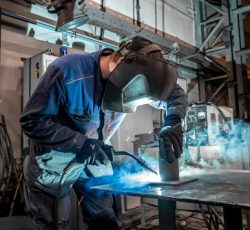 In the world of manufacturing and construction, the terms “metal fabrication” and “machining” are often used interchangeably, leading to confusion. While both processes involve working with metal, they are distinct in their techniques and application. This blog aims to clarify the difference between metal fabrication and machining, exploring their similarities, how they work together, and ultimately, their differences.
In the world of manufacturing and construction, the terms “metal fabrication” and “machining” are often used interchangeably, leading to confusion. While both processes involve working with metal, they are distinct in their techniques and application. This blog aims to clarify the difference between metal fabrication and machining, exploring their similarities, how they work together, and ultimately, their differences.
What is Machining?
Machining refers to the process of shaping metal through the removal of material, usually through cutting, drilling, and grinding. It involves using various types of machines such as lathes, mills, and drills to create precise and intricate components or parts from raw material. Machining is commonly used in industries that require high precision and tight tolerances, such as aerospace, automotive, and medical.
When it comes to machining, the focus is on the final product rather than the process. The machinist follows specific blueprints or CAD designs to remove unwanted material and create the desired shape. This subtractive method enables the production of parts with intricate details that may not be feasible through other manufacturing techniques.
What is Metal Fabrication?
Metal fabrication, on the other hand, is a broader term that encompasses various processes involved in creating metal structures and components. Unlike machining, metal fabrication involves manipulating and assembling metal pieces to achieve a particular shape or structure rather than removing material. It entails techniques such as welding, bending, cutting, and forming to transform raw metal into usable objects.
Metal fabrication serves a wide range of sectors, from construction and architecture to industrial manufacturing and even art. It allows for immense flexibility in design and enables the creation of complex structures that cannot be achieved through machining alone.
Similarities and How They Work Together
While machining and metal fabrication are distinct processes, they often go hand in hand to achieve the desired end product. Both techniques require skilled operators who understand the properties and capabilities of different metals and the machinery involved.
In many manufacturing processes, metal fabrication precedes machining. This means that fabricators shape the basic structure or component, and then machinists refine it further by removing excess material and adding precise features. For example, in the production of a machine part, fabricators will first use bending and welding techniques to create the initial shape, and then machinists will use precision cutting and milling to achieve the final dimensions and tolerances.
Differences
The main difference between metal fabrication and machining lies in their core techniques. Fabrication focuses on the manipulation and assembly of metal pieces, whereas machining is primarily a subtractive process that involves removing material to shape the metal. Fabrication relies on tools like welding machines, presses, and bending equipment, while machining utilizes lathes, mills, and drills.
Moreover, the design approach is different for both processes. In machining, the focus is on the final product’s precision and tolerances, resulting in detailed blueprints or CAD designs that dictate the machining steps. Fabrication, on the other hand, often relies more on the skills and experience of the fabricator. While CAD may still be used, the emphasis is on the ability to manipulate metal and create structures that meet the desired specifications.
Summary
Metal fabrication and machining are distinct yet interconnected processes in the world of manufacturing. While machining precisely removes material to achieve desired shapes, metal fabrication involves manipulating and assembling metal pieces. These techniques often complement each other, with fabrication providing a foundation for machining. Understanding their strengths and differences is essential in choosing the most effective method for any given manufacturing project.
Need a Machine Shop in Atmore, AL?
Escofab Inc. has been dedicated to providing quality machining and fabrication since 1981! Here at Escofab Inc. we utilize fabricating and machining to your specifications. We work to fit your needs and ensure customer satisfaction. Our friendly and informative staff are eager to assist you! Give us a call or come on in today; walk-ins welcome!
